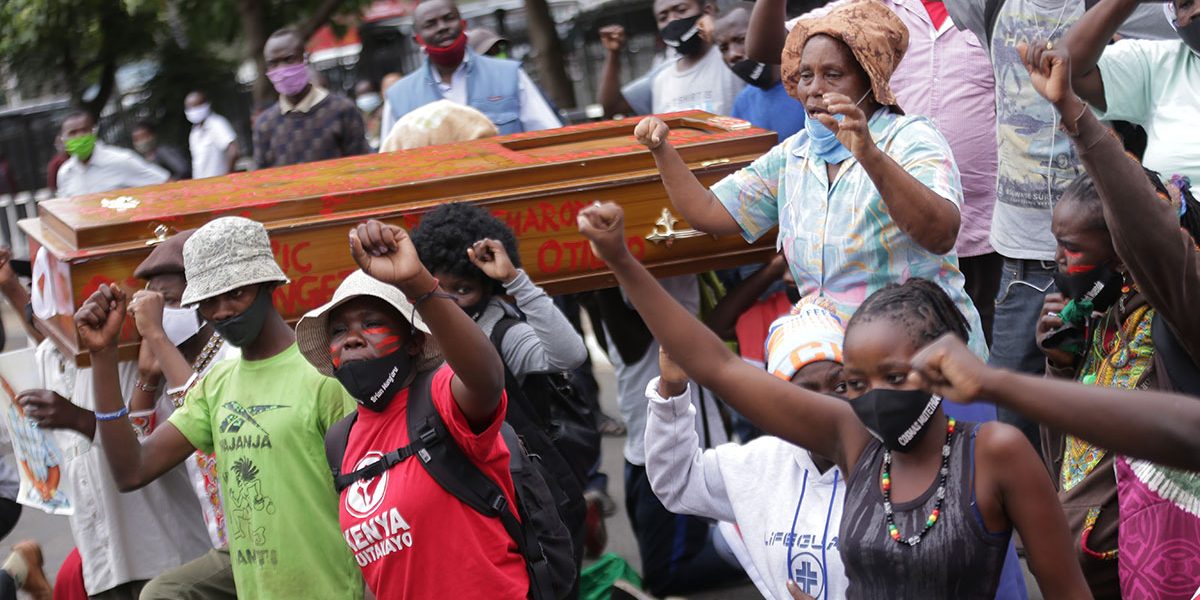The world continues to battle the COVID-19 pandemic. Four months after the first case in Africa, it is clear that what started as a health crisis has turned into a socio-economic and societal crisis that is threatening the livelihood of millions on the continent.
While knowledge on the virus is evolving and responses continue to be a “work in progress”, the disease has revealed and widened gaps in social systems, with a disproportionate impact on women and girls. As governments took measures to contain the spread of the virus, it soon emerged that the lockdown imposed by many countries sometimes meant no escape from abusive partners – cases of domestic and gender-based violence were increasing. This exposed once more that one of the first challenges in crises is the urgent implementation of the women, peace and security (WPS) agenda, to ensure that women’s rights are protected and that they participate in and lead the search for solutions.
The AU Peace and Security Council has recognised that the COVID-19 pandemic constitutes a security threat, constraining the continuation of mediation efforts in ongoing conflicts on the continent and causing a reduction in resources allocated to refugees and internally displaced people.
Moreover, the guns are far from silent in Africa. The continued fight in Libya, and widespread and persistent attacks by extremist groups in the Sahel, Lake Chad Basin and the Horn of Africa, with specific targeting of women and adolescent girls, must claim our attention. Fighting continues, despite the urgency expressed by the chairperson of the African Union Commission (AUC) in his call to belligerents to stop fighting, and the United Nations (UN) Secretary General’s similar call on all warring factions in the world to declare a ceasefire.
Faced with the COVID-19 pandemic, Africa responded swiftly and cohesively under the leadership of Cyril Ramaphosa, president of the Republic of South Africa and chairperson of the African Union, with the support of Moussa Faki Mahamat, chairperson of the AUC, who is leading the operationalisation of Africa’s response. Through these coordinated efforts, the Africa Centres for Disease Control and Prevention (Africa CDC) has been at the forefront of Africa’s responses, dispatching personal protection equipment (PPE) to all countries, spearheading the creation of the Partnership to Accelerate COVID-19 Testing in Africa (PACT) and putting in place pooled procurement strategies.
Women-led organisations have also mobilised, using their meagre resources to stand up against the rise in sexual and gender-based violence and to support communities. On 15 May 2020, Riya Yuyada, executive director of Crown the Women Organization, organised a peaceful demonstration demanding an end to impunity for rape and violence against women and girls in the country. “We a group of women activists is collectively demanding that the government leaders and decision-makers to commit to our demands, we demand justice for the eight-year-old girl that was raped and for many other women and girls who have not received justice.” In Sudan, MANSAM – a coalition of women’s organisations and civil society groups – took on the pandemic by making masks, donating needed supplies, distributing posters with essential information and raising awareness about the virus via social media. In her remarks at the virtual consultation of the African Women Leaders Network (AWLN) on COVID-19 responses, President Sahle-Work Zewde of the Federal Democratic Republic of Ethiopia and AWLN pioneer cautioned against the restructuring of commitments for women empowerment. She stated: “Lockdowns have put more women at risk. We must remain vigilant that COVID-19 is not used as an excuse to restructure and underprioritise the programmes and projects earmarked for women, now and post-crisis.”
Women-led organisations that are dealing with peace, security and development are playing a key role in developing policies, strategies and guidelines for gender-responsive actions to prevent and combat COVID-19, and in post-COVID-19 recovery. Indeed, in her statement on WPS, the AU Special Envoy on Women, Peace and Security stressed that “[t]he COVID-19 crisis is a security threat that calls for our utmost mobilization and solidarity”.
Building better is grounded on the premise of the nexus between peace, security, humanitarian action and development. Responses must be anchored in human security that will truly cater for our people and communities, addressing diverse issues encompassing the critical areas identified by ACCORD as potential conflict drivers in the COVID-19 and the post-COVID-19 recovery period. We know that there is no peace without development, and vice versa.
In the area of WPS, 2020 is a crucial year, and COVID-19 should not make Africa lose the gains of the past 20 years since the adoption of UN Security Council Resolution 1325. Africa has currently 30 countries that developed national action plans (NAPs) on WPS.
The AU has a Continental Results Framework (CRF), adopted by the AU Peace and Security Council (PSC), which supports member states in the delivery of their commitments. As countries renew their NAPs, it is important that our monitoring and reporting tools integrate the impact of and responses to COVID-19.
The new ecosystem of WPS should include not only the right policies and guidelines but should also adopt a more inclusive approach, pulling together stakeholders – including the private sector and the youth – for innovative answers, using technology to leapfrog solutions.
It is also imperative that resources are availed to key stakeholders, including women and women-led organisations, to strengthen their community-centred actions. Indeed, we have seen the consequences; we are living the impact on the lives of women and girls. More talks will not change the situation. Only informed actions will take us out of the boxes of “business as usual”.
I call for a fundamental shift in our agenda for peace and transformation. Our actions must be anchored on three critical pillars: women’s leadership, investments in social infrastructures for human security, and solid accountability.
Bineta Diop is the AUC Special Envoy on Women, Peace and Security, and founder and chairperson of the board of Femmes Africa Solidarité (FAS).

